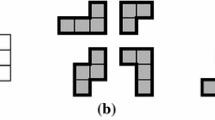Abstract
We study the computational complexity of the puzzle Quell. The goal is to collect pearls by sliding a droplet of water over them in a grid map. The map contains obstacles. In each move, the droplet slides in one of the four directions to the maximal extent, until it is stopped by an obstacle. We show that any-Moves-all-Pearls (deciding whether it is possible to collect all the pearls using any number of moves) can be solved in polynomial time. In contrast, both any-Moves-max-Pearls (finding the maximum number of pearls that can be collected using any number of moves) and min-Moves-all-Pearls (finding the minimum number of moves required to collect all the pearls) are APX-hard, although the corresponding decision problems are in FPT. We also present a simple 2-approximation for any-Moves-max-Pearls, and leave open the question whether min-Moves-all-Pearls admits a polynomial-time constant approximation.
Access this chapter
Tax calculation will be finalised at checkout
Purchases are for personal use only
Preview
Unable to display preview. Download preview PDF.
Similar content being viewed by others
References
Alon, N., Yuster, R., Zwick, U.: Color-coding. Journal of the ACM 42, 844–856 (1995)
Asadpour, A., Goemans, M.X., Madry, A., Gharan, S.O., Saberi, A.: An O(logn / loglogn)-approximation algorithm for the asymmetric traveling salesman problem. In: Proceedings of the 21st Annual ACM-SIAM Symposium on Discrete Algorithms, pp. 379–389 (2010)
Aspvall, B., Plass, M.F., Tarjan, R.E.: A linear-time algorithm for testing the truth of certain quantified boolean formulas. Information Processing Letters 8, 121–123 (1979)
de Berg, M., Cheong, O., van Kreveld, M., Overmars, M.: Computational Geometry: Algorithms and Applications, 3rd edn. Spring, Heidelberg (2008)
Christofides, N.: Worst-case analysis of a new heuristic for the travelling salesman problem. Technical report 388. Graduate School of Industrial Administration, Carnegie-Mellon University, Pittsburgh (1976)
Crescenzi, P., Silvestri, R., Trevisan, L.: On weighted vs unweighted versions of combinatorial optimization problems. Information and Computation 167, 10–26 (2001)
Engels, B., Kamphans, T.: Randolphs robot game is NP-hard! Electronic Notes in Discrete Mathematics 25, 49–53 (2006)
Frieze, A.M., Galbiati, G., Maffioli, F.: On the worst-case performance of some algorithms for the asymmetric traveling salesman problem. Networks 12, 23–39 (1982)
Hartline, J.R., Libeskind-Hadas, R.: The computational complexity of motion planning. SIAM Review 45, 543–557 (2003)
Håstad, J.: Some optimal inapproximability results. Journal of the ACM 48, 798–859 (2001)
Hearn, R.A., Demaine, E.D.: Games, Puzzles, and Computation. CRC Press (2009)
Hock, M.: Exploring the Complexity of the UFO Puzzle. B.S.Thesis, Department of Computer Science, Carnegie Mellon University (2002), http://www.cs.cmu.edu/afs/cs/user/mjs/ftp/thesis-program/2002/hock.ps
Khot, S., Kindler, G., Mossel, E., O’Donnell, R.: Optimal inapproximability results for MAX-CUT and other 2-Variable CSPs? In: Proceedings of the 45th Annual IEEE Symposium on Foundations of Computer Science, pp. 146–154 (2004)
Papadimitriou, C.H., Vempala, S.: On the approximability of the traveling salesman problem. Combinatorica 26, 101–120 (2006)
Author information
Authors and Affiliations
Editor information
Editors and Affiliations
Rights and permissions
Copyright information
© 2014 Springer International Publishing Switzerland
About this paper
Cite this paper
Jiang, M., Tejada, P.J., Wang, H. (2014). Quell. In: Ferro, A., Luccio, F., Widmayer, P. (eds) Fun with Algorithms. FUN 2014. Lecture Notes in Computer Science, vol 8496. Springer, Cham. https://doi.org/10.1007/978-3-319-07890-8_21
Download citation
DOI: https://doi.org/10.1007/978-3-319-07890-8_21
Publisher Name: Springer, Cham
Print ISBN: 978-3-319-07889-2
Online ISBN: 978-3-319-07890-8
eBook Packages: Computer ScienceComputer Science (R0)




